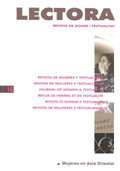Chiasmatic Narrative and Twisted Subjectivity in Kanai Mieko's Boshizô
Keywords:
Japanese literature, psychoanalysis, Kanai Mieko, Boshizô, female subjectivity, Oedipus complex, female desire, incestAbstract
The article provides a reading, from a psychoanalytic point of view, of Japanese writer Kanai Mieko’s short tale Boshizô (Portrait of Mother and Child), published in 1992, as a “twisted” or “contorted” parable of the construction of female subjectivity. Establishing connections between the form and the content of the novel, the essay analyzes how Kanai’s use of the rhetorical figure of the chiasmus structures the internal narrative of the novel at the same time that it reflects the process of formation of female subjectivity and desire. The novel becomes, thus, a staging of the female Oedipus complex which plays out its twists.Downloads
Published
How to Cite
Issue
Section
License
The Author retains ownership of the copyright in this article and grants Lectora: revista de dones i textualitat the rights to print publication of the Article. The work will be available under a Creative Commons Attribution-Noncommercial-No Derivative Works license, by which the article must be credited to the Author and the Journal be credited as first place of publication.
The Author is free to enter in seperate, additional contractual agreements for the non-exclusive distribution of the work as published in this journal (such as institutional repositories or a book), as long as the original publication in Lectora is credited.
The Author is encouraged to post the work online (eg in institutional or thematic repositories, or in their website), as it can lead to productive exchanges as well as to a greater citation of the published work (see The Effect of Open Access).




